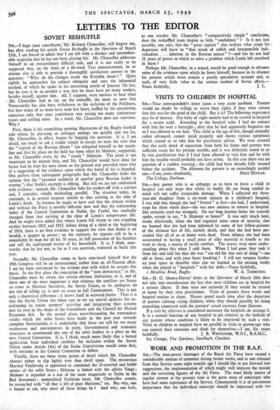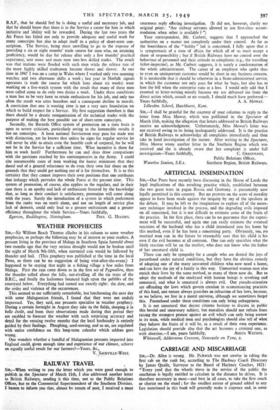WORK AND PROMOTION IN THE R.A.F.
SIR,—The man-power shortages of the Royal Air Force have caused a
considerable amount of comment during recent weeks, and as one released from that Service some eight months ago I should like to put forward two suggestions, the implementation of which might well improve the morale
and the recruiting figures of the Air Force. The most likely source of regular airmen at the present time is the great mass of conscripts who have had some experience of the Service. Consequently it is of paramount importance that the individual conscript should be impressed with the R.A.F., that he should feel he is doing a useful and necessary job, and that he should know that there is in the Service a career for him in which initiative and 'ability will be rewarded. During the last two years the Air Force has failed not only to provide adequate and useful work for many conscripts but also to adapt itself to a policy of short-term con- scription. The Service, being most unwilling to go to the expense of providing a six or eight months' trade course for men who, on attaining proficiency, would be due for release after only a few months' practical experience, sent more and more men into less skilled trades. The result was that 'stations were flooded with such men while the release rate of the more highly skilled tradesmen became slower and slower. At one time in 1947 I was on a camp in Wales where I worked only two morning watches and two afternoon shifts a week ; last year in Norfolk signals operators (a trade the course for which lasts about six weeks) were working on a five-watch system with the result that many of these men were called uoon to do only two duties a week. Under these conditions a man has to be very keen to retain enthusiasm for his job, and only too often the result was utter boredom and a consequent decline in morale. A conviction that one is wasting time is not a very sure foundation on which to build respect for a Service. My first suggestion therefore is that there should be a drastic reorganisation of the technical trades with the purpose of making the best possible use of short-term conscripts.
Secondly, the Records Office system of promotion on a time basis is open to severe criticism, particularly owing to the lamentable results it has on conscripts. A keen national Serviceman may pass his trade test with distinction, yet he knows that unless he signs for regular service he will never be able to attain even the humble rank of corporal, for he will not be in the Service for a sufficient time. What incentive is there for him to work hard? Furthermore he can and does draw comparisons with the positions reached by his contemporaries in the Army. I could cite innumerable cases of men working the barest minimum that they dared and of a general reluctance to do even their own fair share on the grounds that they could get nothing out of it for themselves. It is to this certainty that they cannot improve their own positions that one attributes that lethargy which pervades the whole Force at the present time. This system of promotion, of course, also applies to the regulars, and in their case there is an apathy and lack of enthusiasm fostered by the knowledge that, as long as their conduct is satisfactory, promotion will come along with the years. Surely the introduction of a system in which preferment from the ranks was on merit alone, and not on length of service plus lack of demerit, could only lead to a greater enthusiasm and a greater efficiency throughout the whole Service.—Yours faithfully,
Egerton, Ruddington, Nottingham. PAUL G. HUGHES.















































 Previous page
Previous page